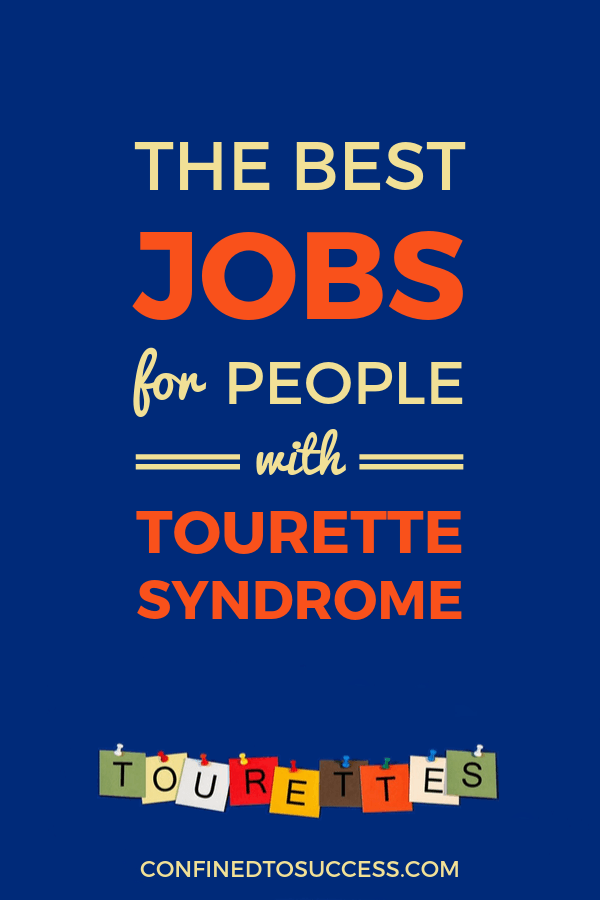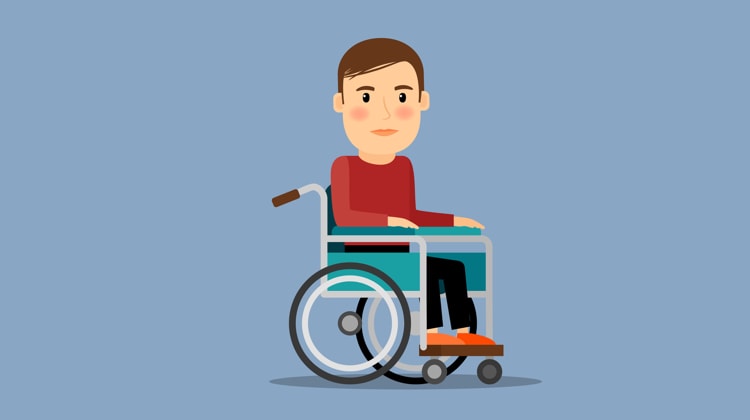Best (And Worst) Jobs For People With Tourette Syndrome

Having Tourette Syndrome often means battling stereotypes. At best, it’s merely regarded as a bad habit or sign of nervousness. At worst, it’s mocked or regarded with disgust (especially by the media). These misconceptions can trickle into the workplace, making employment difficult. [source]
Fortunately, jobs for people with Tourette Syndrome are available where you’re less likely to encounter issues such as those described. Before we take a look at these opportunities, let’s start with the types of work conditions you should avoid at all costs, if possible…
WORST WORK CONDITIONS FOR PEOPLE WITH TOURETTE SYNDROME
Some work conditions have stressors that can intensify Tourette’s or provide no refuge for symptom management:
- Jobs with a strict dress code – Tics can worsen when you have to wear non-casual clothing (men: suit jacket, vest, button-down shirt, dressy shoes, and women: blazer, dress, blouse, heels). Wearing traditional business attire, particularly in hot, humid weather, can be distressing.
- Early clock-in and long on-the-job hours – When you have Tourette Syndrome, symptoms escalate with sleep deprivation. The trigger could be a pre-dawn work shift. Long hours can be draining, too. You have to spend more of the day censoring your physical and vocal tics as a result.
- High-stress jobs – These jobs are hazardous because stress is the main tic trigger. Workplace stressors could include tight deadlines, a fast-paced environment, demanding bosses and competitive co-workers.
- Jobs where you need to be “on” much of the time – Jobs with an open floor plan, lacking partitions or cubicles, can be distressing if you have Tourette Syndrome. High-profile jobs where you have to go to meetings, give presentations and meet with clients are also rough.
- Workplaces with environmental contaminants – Tics can be a reaction to perfumes, dust, mold and cleaning products. This is compounded by the fact that in the office, an employee is usually powerless to control or alter his or her surroundings.
- Long commutes – A long drive to and from work, with traffic jams, honking horns, and irritable people, can aggravate Tourette symptoms.
Given these poor work environments, let’s now take a look at some of the jobs that would be a poor match for Tourette sufferers…
WORST JOBS FOR PEOPLE WITH TOURETTE SYNDROME
- Jobs with direct, prolonged contact with people – This goes for jobs including retail, restaurants, fast food, customer service, bank teller, receptionist or any job where you’re dealing head-on with the public most of the day. These jobs corner you and provide no time or place for a tic break.
- Human resources – In this career, you’ll likely encounter angry, frightened, sad, and downright devastated people. You have to handle their complex situations while remaining as unemotional as possible.You’ll have to field an avalanche of resumés, shorten the list of candidates, interview them, then whittle those down to the finalist. On top of that, you’ll be in the crosshairs of legalities and disability disputes. HR is a precarious job for someone with Tourette Syndrome.
- Public relations – This field is an extremely fast-paced, high-pressure job with very tight deadlines and intense contact with people. You’ll be communicating with the public on behalf of companies, entertainers, individuals, and politicians.As a publicist, you’ll be placing your clients’ message throughout many media platforms and coordinating interviews for them with those platforms. PR has a damaging level of intensity for people with Tourette’s.
- Police officer, firefighter, paramedic – These jobs are extraordinarily demanding because you often have to make life or death decisions and make them in a split second. If you’re a police officer or a firefighter, your life can hang in the balance, as well. These professions are toxic for anyone with Tourette Syndrome.
Let’s now switch gears and take a look at the kinds of work environments that may suit if you suffer from Tourette Syndrome…
BEST WORK CONDITIONS FOR PEOPLE WITH TOURETTE SYNDROME
- A sympathetic employer – An understanding employer won’t let your condition negate your experience, strengths, and accomplishments. He or she will see the person, not the symptoms. A good boss will educate co-workers about your Tourette Syndrome, urge them to be understanding and may even modify the workplace to accommodate you.
- A cubicle – When you have Tourette, a cubicle or private office provides a discreet, isolated area where you can tic.
- Jobs that require concentration – Physical jobs, such as the chainsaw tree surgery done by Tom Dufton of the BBC “Employable Me” documentary can laser-focus you away from your tics. [source]
- Electronic meetings – Meetings that are conducted via conference calls, video conferencing and Skype can relieve you of in-person pressure.
- Self-employment – While you’ll still have times when you’ll need to be around people, your solitary time (as well as time when you can wear casual clothes) will be less likely to intensify your symptoms.
Based on the criteria outlined above, here are some jobs that match up for Tourette sufferers…
BEST JOBS FOR PEOPLE WITH TOURETTE SYNDROME
- Tutor – Tutoring is a great option because it entails working one-on-one with someone who needs to learn something new or get a refresher on something they already know. This could include teaching a foreign language, helping a non-English speaker learn English, giving piano lessons, strengthening someone’s math skills and giving reading lessons. You can even tutor online with outlets like iTutor.
- Musician – Many musicians who have Tourette, such as singer Adam Ladell [source] and heavy metal drummer James Sayers [source], find that their tics completely disappear when engrossed in their music.
- Freelance writing and editing – Freelance writing and editing provide an ideal work-from-home opportunity for people with Tourette’s. You can do everything from blogging to writing for print and online magazines, to editing and proofreading.
- Graphic design – This is a job you can pursue from home, possibly with only a few in-person client meetings. Many media and marketing companies depend upon freelance graphic designers to create illustrations for web ads, websites, social media pages and more. The intense focus of graphic design may make your tics more manageable. Fiverr can be a good freelance platform to offer your services.
- Survey taker – Sure, it’s not a “career,” but filling out surveys online can be a nice way to bring in some extra cash while exploring other business opportunities (for an in-depth guide on how to get started taking surveys, visit my guide here).
- Affiliate marketing – This online work opportunity could be a dream-come-true if you have Tourette Syndrome as it allows you to from home where you won’t have to worry about your tics. This setup means you can wear comfy clothes and be free from stressful or restrictive workplace situations.Affiliate marketing is one of the most popular ways of making money online. As an affiliate marketer, you earn commissions by promoting someone else’s merchandise, whereupon you earn a percentage of the profit per sale.Basically, you’ll need a website or blog containing a link(s) to the product you’re promoting. Whenever someone clicks the link and buys the specific product, you earn commission from it. Best of all, you don’t have to deal with customer returns, shipping, inventory or any of the other headaches that come with being a merchant.
NOW IT’S YOUR TURN!
What do you think? Are there other jobs you’d recommend for fellow Tourette sufferers I haven’t mentioned? Share your thoughts in the comments below!







